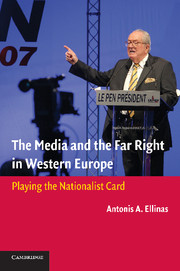Book contents
- Frontmatter
- Contents
- List of Figures
- List of Tables
- Acknowledgments
- Acronyms and Abbreviations
- 1 Introduction
- 2 Explaining Far Right Trajectories
- 3 Party and Media Politics in Austria: The Rise of the FPÖ
- 4 Competing over German Identity: Conservatives and the Nonvisible Far Right
- 5 Greek Nationalists: From Mainstream to the Margins?
- 6 The Growth, Persistence, and Fall of the French National Front
- 7 Conclusion
- Bibliography
- Index
3 - Party and Media Politics in Austria: The Rise of the FPÖ
Published online by Cambridge University Press: 04 May 2010
- Frontmatter
- Contents
- List of Figures
- List of Tables
- Acknowledgments
- Acronyms and Abbreviations
- 1 Introduction
- 2 Explaining Far Right Trajectories
- 3 Party and Media Politics in Austria: The Rise of the FPÖ
- 4 Competing over German Identity: Conservatives and the Nonvisible Far Right
- 5 Greek Nationalists: From Mainstream to the Margins?
- 6 The Growth, Persistence, and Fall of the French National Front
- 7 Conclusion
- Bibliography
- Index
Summary
In the universe of cases the literature often associates with the West European Far Right, Austria is one of the most fascinating and puzzling ones. Up until the mid-1980s, the Alpine country had one of the most stable party systems in Europe. “Exceptionally predictable” (Sully 1981: ix) and with “a reputation of a very high degree of stability” (Plasser 1989: 41; see also Müller 1993), the Austrian system had nearly fallen out of favor among political scientists who were increasingly more interested in explaining electoral change (e.g., Inglehart 1971; Flanagan and Dalton 1984; Przeworski and Sprague 1986; Lawson and Merkl 1988; Pedersen 1990; Kitschelt 1994; Pontusson 1995) than rigidity (e.g., Rose and Urwin 1970; Lipset and Rokkan 1990). It took the spectacular growth of the Far Right Freedom Party (FPÖ) to push Austrian politics back into the international scholarly limelight.
The FPÖ, which had stagnated at about 5.5% of the overall vote for almost twenty years and “had already been on its deathbed” (Müller et al. 2004: 174), witnessed a five-fold growth in support during a thirteen-year period. Through a series of electoral breakthroughs, it managed to break the forty-year duopoly of the Socialist Party of Austria (SPÖ) and the Christian democratic or conservative Austrian People's Party (ÖVP). This put Austria back on the political science map, but it problematized the conventional scholarly explanations for Far Right performance. For unlike many of its European counterparts, the FPÖ did not thrive in a high-unemployment environment.
- Type
- Chapter
- Information
- The Media and the Far Right in Western EuropePlaying the Nationalist Card, pp. 41 - 75Publisher: Cambridge University PressPrint publication year: 2010
- 1
- Cited by



